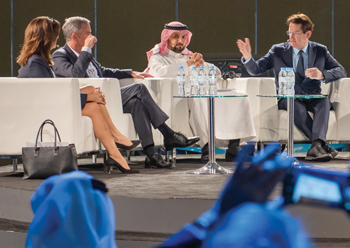
 Konieczna ... more than a name change.
Konieczna ... more than a name change.
After 44 highly-successful editions, Middle East Electricity (MEE) will evolve into Middle East Energy in 2020 – an energetic transformation which aims to keep the region’s leading power industry event at the forefront of a rapidly-evolving sector.
As demand for digitalised and renewable energy solutions increases across the globe, the future-focused Middle East Energy platform will bring together leading luminaires of the global industry, from energy ministers and utilities decision makers to innovative start-ups and future technology providers.
It will be held at the Dubai World Trade Centre from March 3 to 5 under the patronage of His Highness Sheikh Maktoum Bin Mohammed Bin Rashid Al Maktoum, Deputy Ruler of Dubai. The event is being hosted by the UAE Ministry of Energy and will also feature a complimentary matchmaking service for exhibitors and visitors and tailored conference series, which will probe the most pressing industry issues of the day across the Middle East’s energy sector.
As part of Informa Markets’ objective to reinforce the event’s standing as a holistic energy platform that empowers stakeholders through power networking and multi-sector growth opportunities, Middle East Energy will host new zones, including a customised Digitalisation Zone, highlighting the latest technologies in digital transformation and an expanded Renewables Area.
Furthermore, with leading global brands launching innovative solutions, the decision to reenergise the Middle East Electricity brand is timely, believes Informa Markets, as the event continues to reflect how the world raises, distributes and consumes energy.
“This is much more than a name change,” explained Claudia Konieczna, exhibition director, Middle East Energy.
“Driven by extensive outreach and stakeholder engagement, this strategic move builds on the legacy of Middle East Electricity and takes the event to a new level to better reflect the industry we serve, an industry that continues to evolve well beyond the traditional electricity segment.”
Konieczna said while the electricity segment remains a core element in the wider energy field, the wider sector is now replete with advancing technologies spanning energy sources, renewables and digitalisation.
Middle East Energy will serve a region that is forecasted to require $109 billion in power infrastructure investment over the next five years, according to the Mena Power Industry Outlook report by Ventures Onsite for Middle East Energy.














.jpg)












































